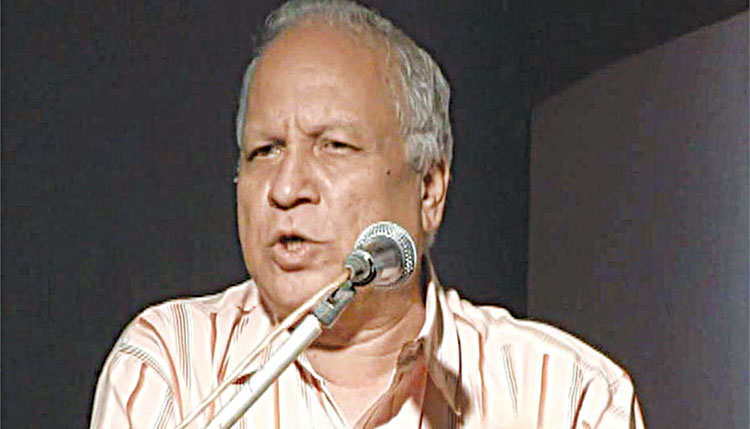
New Delhi, Jul 11 (Mayank Nigam) Rajya Sabha member and noted Journalist Kumar Ketkar said the Nationalisation of banks has benefited common people and middle class the most. Delivering his lecture on the tenth day of the month-long AIBEA National Webinars to commemorate the 52nd anniversary of Bank Nationalisation on theme ‘Vibrant Banking for Vibrant India’ and focus ‘people’s money for people’s Welfare’, on Saturday evening, the Padma Shri Awardee narrated the political scenario that obtained in the country in 1960s which finally resulted in former Prime Minister Indira Gandhi Nationalising 14 major private Banks.
Congratulating AIBEA for celebrating the 52nd anniversary of Bank Nationalisation, he explained that the world was entirely different in 1969 and nobody would have realised way back then that 50 years later, the Government of India would try to dismantle the Public Sector Institutions. Mr Ketkar said today people would be wondering as to how the Government would denationalize the public sector banks. But, the present BJP-led NDA Government has abrogated Article 370 of the Constitution, bulldozed the farm laws against the interest of the peasants and farmers. ”Therefore, the misgiving that this Government would not privatise the public sector banks should not hinder us from agitating. This Government would try its best to privatise the public sector units but it is also a fact that if we fight decisively, we can stop the government from moving ahead like the farmers stopping the implementation of farm laws due to their eighth-month long agitation”.
He said in 1962, there was a huge March held in the National Capital to Nationalise the public sector banks and added though after the first Prime Minister of India Jawaharlal Nehru died in 1964, there was no change in the socialist policy of the country. There was also unemployment, poverty was increasing and hence, Indira Gandhi said that there should be a shift in the economic policies in both the conventions of Congress Party, held in Ahmedabad and Bangalore, Mr Ketkar said. The noted Journalist said When Nationalisation of Banks was proposed, Mr. Morarji Desai opposed it and said the banks needed only social control and hence he was asked to resign and removed from the party. After which, on July 19, 1969, 14 major banks were nationalised. But, the right-wing politicians with the support of international capital, they tried to topple the nationalisation of banks with the intervention of Supreme Court. But, Indira Gandhi was not deterred and she plugged the loopholes and re-introduced the ordinance of Nationalisation of banks, he added. Subsequently due to the various developments in the country, in 1975, emergency was declared in the country. Many things went wrong in the emergency period. Indira Gandhi was defeated in 1977 but Janata Party could not sustain for a full five years due to the right-wing policies pursued by them and the in-fighting within Janata Party.
Even in 1977, there was an attempt to dismantle Planning Commission. After coming back to power in 1980, Indira Gandhi made 6 more banks into the ambit of public sector banks. The Rajya Sabha MP said today’s middle class owes much to the public sector banks and the help of the nationalised banks to uplift them to this level. Banks are spread out across the rural areas, the priority sector loans, agriculture advances are all due to the public sector banks and their social objectives. Bank Nationalisation gave new prosperity to the rural sector and bank nationalisation helped to reduce poverty, he maintained. Mr Ketkar said Middle Class population was 15% in 1969 and if it is more than 40%, it is because of the Bank Nationalisation. The same middle class, who were the beneficiaries of the bank nationalisation and the credit from the public sector banks, are supporting the present incumbent right-wing government. Without the bank nationalisation, this prosperity would not have come to the middle class. The identity crisis has catapulted the present government to power, he added. In USA, there was hardly 8 lakhs Indians in 1986 but now there are 40 lakhs Indians in America and they are supporting and funding the right-wing politicians like BJP and that is the reason why the policies of the Government are trying to marginalize the public sector banks. Privatisation of public sector banks is reversing the clock back and it will be detrimental to the economy of the country and its people.
The NDA government is trying to denationalize and privatise not only the banks but also LIC, other public sector units. This is an attack on the sovereign economic policies of the country, he said, and asked AIBEA to take lead in starting a united movement against the privatisation attempts of not only the public sector banks but also the other public sector units. There is no separate economic issue and political issue and both are inter-connected and hence, privatisation of public sector banks would lead to deterioration of India’s sovereignty and the overall growth of the country. This Government is not even disclosing the names of the willful defaulters of bank loans. He demanded that criminal action should be taken against willful corporate defaulters.

